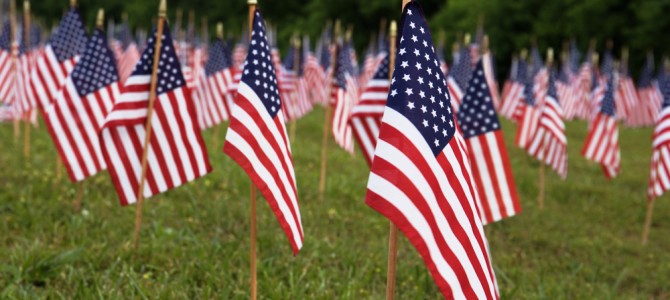
If you’re an American with a social media account, you probably didn’t get through this past Memorial Day without seeing a meme that looked something like this:
A few of these holiday-explaining memes were snarky in tone, but for the most part they provided a needed reminder. Our patriotic holidays each have a unique purpose and shouldn’t be homogenized. In fact, my friends who are veterans have been especially insistent about keeping Memorial Day distinct from Veteran’s Day. “Please don’t thank me for my service this weekend,” one friend wrote last May. “Please just honor and remember the fallen who gave the ultimate sacrifice.”
But there is noticeably less effort to preserve Independence Day’s distinct meaning. At many parades and gatherings, the Fourth of July looks like another all-purpose, vaguely military holiday, where—somewhere between food and fireworks—we sing “God Bless America” and take a moment to thank our veterans for keeping us free.
Now, any day is a good day to thank a veteran for his or her service. Still, I think we’re missing something important about Independence Day—and about freedom itself.
A Nation Is Born
First, in the spirit of remembering what holidays are all about, let’s state the obvious. Our national holiday commemorates July 4, 1776, when the Continental Congress—representing the citizens of 13 colonies—adopted a document declaring that all men are “endowed by their Creator with certain unalienable Rights” and that “to secure these rights, Governments are instituted among Men, deriving their just powers from the consent of the governed.” After establishing at length that the king had been destroying these rights, the document concluded that “these united Colonies are, and of Right ought to be Free and Independent States, that they are Absolved from all Allegiance to the British Crown.”
This declaration was monumental. It meant the war that had already been raging for more than a year was more than a mere protest by the king’s subjects; it was a full-out rebellion, and its goal was independence. The American people would hereafter not just be fighting against certain policies of the king, they would be fighting for something: liberty, and a nation of their own.
To gain that liberty, the 56 men who signed the Declaration of Independence—and all the people they represented—would have to assume a tremendous risk. They knew the conflict would now be in even deadlier earnest, and that war would be waged right in their midst, among their homes, villages, and farms. They knew their very lives and the lives of their families would be in danger. Yet they decided, as Patrick Henry had famously a year earlier, that death itself was better than life without liberty.
We should note that this decision was primarily made by civilians. Most of the signers of the Declaration were not soldiers, nor were most of the people they represented. Some would go on to join the rag-tag Continental Army, while others simply bore the deprivations and horrors of a landscape torn by war. In many cases, their lives and fortunes took a sharp turn for the worse. In his book “1776,” historian David McCullough recounts how British and German soldiers invading and ransacking Long Island, New York, marveled at the prosperity they saw among the colonists there. They were shocked that such well-fed people would choose to rebel against their government. Clearly, these Americans placed a high value on freedom, and they were willing to pay dearly for it.
Of course, those who paid the highest price were the men who took up arms and became soldiers. Without George Washington and his army, Thomas Jefferson’s magnum opus would have amounted to nothing more than words on paper. But without the ideals expressed in the Declaration—and a people willing to sacrifice for those ideals—there would have been no cause for which to fight. Thus we remember the adoption of a document, not a military victory, as the moment our nation was born.
Give Me Liberty or Give Me . . . Never Mind
Today, 240 years after that fateful, sweltering day in Philadelphia, it’s hard to imagine modern Americans making a similar decision to risk everything for the sake of liberty. These days safety is our god, and we’ll gladly sacrifice freedom on its altar.
Take the recent debate over gun control, for example. Despite the fact that America’s gun homicide rate has dropped by nearly 50 percent over the past decade, many are so shaken by incidents like the Orlando terrorist attack that they’re clamoring to toss the Second, Fourth, and Fifth Amendments on the scrap heap of history. Of course, the prospect of a mass shooting is frightening for anyone to contemplate. But it’s a statistically remote danger compared to the all-encompassing threat of a government empowered to strip its citizens of rights without due process of law. The armed commoners standing on Lexington Green in 1775, defying a military superpower to come confiscate their weapons, understood this.
Our modern “safety first” mentality extends to fiscal matters, too. We say we want economic freedom, but we don’t want the inherent risk that such freedom entails. Instead, we’d rather have government bailing out our failing industries. We want the central bank tightly controlling interest rates. We want the state to care for us in our old age, give us health care and make other people pay for it, make sure we have a “living wage,” pay for our kids’ college, and take care of the poor so we don’t have to. We’re scared to do without all these government programs we’ve come to expect, even if it means our freedoms are eroded and we’re sold into indentured servitude in the form of crippling debt. Safety first!
Frankly, far too many of us think nothing of sending someone else’s son, husband, sister, or mother to “defend freedom overseas” while remaining unwilling to take a single risk ourselves, no matter how small, in order to defend freedom here at home. Saying “thank you” to our military on holidays rings a bit hollow when we treat the liberty for which they fight with contempt in our daily lives.
Freedom Requires Bravery from Us All
That brings us back to what we’re missing about Independence Day. July 4 should be a celebration of the ideals that formed this nation, and a reminder that all Americans—not just the military—have a role to play in defending them. When we downplay the role of ordinary civilians in safeguarding freedom, we also downplay their responsibility.
Our fighting men and women take an oath to “support and defend the Constitution of the United States against all enemies, foreign and domestic.” But it isn’t only up to them. It can’t be. Today, the direst threats to the Constitution of the United States don’t come violently from outside our borders, but peaceably from within. In a representative government, we the people are chiefly responsible to support and defend the Constitution—in the way we vote, the policies for which we advocate, and the way we live in our communities.
Benjamin Franklin once famously said that the Constitutional Convention had created “a republic, if you can keep it.” At the time, he was speaking not to a professional soldier, but to an ordinary American woman. The charge to “keep” the republic belongs to us all. It will require bravery not just from the small segment who are in the armed forces, but from every single one of us.
Make no mistake: freedom is risky. Freedom can be messy. But it is always, always the best way to live. As Thomas Jefferson wrote in 1791, “I would rather be exposed to the inconveniences attending too much liberty than those attending too small a degree of it.” We fool ourselves if we believe that trading away our liberty—won for us at such a high cost—will bring the safety and prosperity we seek.
So this Fourth of July, by all means, thank a veteran or active-duty service member. But also take some time to read the Declaration of Independence and ponder the national spirit embodied by those words. There’s a reason Francis Scott Key, writing the poem which later became our national anthem, called America “the land of the free and the home of the brave.” These two traits—freedom and bravery—once defined us as a people. The former is impossible to maintain without the latter. I pray that somewhere deep in our national DNA, we still have the capacity for both.









